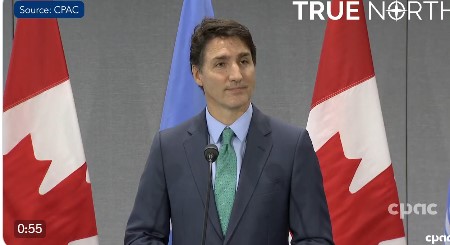
Background and Timeline
jaishankar Fmofindia viral video twitter. It all began with a TikTok video that quickly went viral. The video, created by an Indian-origin Canadian citizen, featured controversial content related to the ongoing farmers’ protests in India. This sparked outrage within the Indian community, both in India and abroad.
The backlash was swift and passionate, as social media platforms became battlegrounds for heated debates and exchanges of opinions. Many Indians accused the creator of spreading misinformation and inciting hatred against their country. Meanwhile, some members of the Sikh diaspora saw this as an opportunity to raise awareness about their concerns regarding the treatment of farmers in Punjab.
As tensions escalated online, it didn’t take long for Canada to become involved in this controversy. The video caught the attention of Canadian politicians who expressed their support for freedom of expression while also acknowledging its potential consequences.
The situation took a diplomatic turn when Canada’s High Commissioner to India was summoned by the Ministry of External Affairs in New Delhi. The Indian government lodged a strong protest against what they perceived as interference in their internal affairs by a foreign nation.
This incident further strained bilateral relations between India and Canada which were already facing challenges due to differences on various issues including human rights concerns. As both countries engaged in diplomatic discussions behind closed doors, international observers wondered how this tension would impact other aspects of their relationship.
As we navigate through these complex waters, it is important to keep an eye on any potential developments that may arise from this tense situation between India and Canada. Will there be a resolution or will tensions continue simmering beneath the surface? Only time will tell.”
Canada’s Allegations
The tensions between India and Canada have escalated due to allegations made by the Canadian government. In recent years, Canada has accused India of numerous human rights violations, particularly against the Sikh community. These allegations are centered around the 1984 anti-Sikh riots in Delhi following the assassination of Prime Minister Indira Gandhi. jaishankar Fmofindia viral video twitter
According to Canada, these alleged human rights abuses continue to affect Sikhs both in India and abroad. The Canadian government believes that their Sikh population should be granted refugee status due to ongoing persecution in India.
Furthermore, Canada has expressed concerns over freedom of speech and expression for its citizens who speak out on issues related to Khalistani separatism or criticize Indian policies towards Sikhs.
These allegations have strained bilateral relations between the two countries. While Canada is known for its strong commitment to human rights, India vehemently denies these accusations and considers them interference into its internal affairs.
This ongoing tension raises questions about how it will impact future diplomatic relations between India and Canada as well as the broader implications for the Sikh diaspora worldwide. Only time will tell what developments lie ahead in this contentious issue that spans continents.
Indian Government’s Response
The Indian government has strongly refuted the allegations made by Canada regarding its involvement in a video that linked Prime Minister Justin Trudeau to Sikh extremism. In a statement, the Ministry of External Affairs stated that these claims were baseless and lacked evidence. jaishankar Fmofindia viral video twitter
The government emphasized that India is committed to maintaining strong bilateral relations with Canada, based on mutual respect and understanding. It reiterated its position that it does not support or encourage any form of terrorism or extremist activities.
Furthermore, the Indian government called upon Canada to exercise caution while making unsubstantiated claims against another country. It urged Canadian authorities to verify facts before jumping to conclusions, as such actions can strain diplomatic ties and undermine trust between nations.
In response to Canada’s request for an investigation into the matter, India has expressed willingness to cooperate fully if concrete evidence is provided. The government remains committed to addressing concerns through established diplomatic channels rather than engaging in a public war of words.
The Indian government’s response reflects its commitment towards maintaining cordial relations with Canada while firmly denying any involvement in the alleged video linking Sikh extremism with Prime Minister Trudeau.
International Response
jaishankar Fmofindia viral video twitter
The tension between India and Canada has not gone unnoticed on the international stage. Several countries and organizations have expressed their concerns regarding the escalating situation.
Many countries, including the United States, United Kingdom, Australia, and France, have called for calm and urged both India and Canada to resolve their differences through diplomatic channels. They emphasize the importance of open dialogue in maintaining friendly relations between nations.
The United Nations also weighed in on the issue, urging restraint from both sides. Secretary-General Antonio Guterres emphasized the need for peaceful resolution and respect for human rights.
In addition to governments, various Sikh diaspora organizations around the world have voiced their opinions on social media platforms. Some express support for Canada’s stance while others call for a peaceful resolution that respects Indian sovereignty.
It is clear that this tension has caught global attention. The international response highlights the significance of maintaining strong bilateral relations based on mutual understanding and respect among nations.
Impact on Bilateral Relations
The recent tensions between India and Canada have undoubtedly had a significant impact on their bilateral relations. The strained relationship has led to a decline in diplomatic interactions and cooperation between the two countries.
One major consequence of this tension is the suspension of high-level visits and exchanges, which are crucial for maintaining strong ties between nations. These visits provide an opportunity for leaders to discuss shared interests, resolve differences, and promote collaboration in various fields such as trade, investment, education, and culture.
Furthermore, the ongoing dispute has also resulted in a decrease in bilateral trade. Both countries have imposed restrictions and tariffs on certain goods, making it more challenging for businesses from either side to engage in cross-border trade activities.
Moreover, there has been a negative impact on people-to-people contacts as well. The tensions have created divisions among Indian communities living in Canada and have sparked debates within Canadian society regarding immigration policies related to individuals from Sikh backgrounds.
These strains on bilateral relations hinder progress towards mutual understanding and cooperation. It is essential for both India and Canada to find ways to address these issues constructively through dialogue and diplomacy rather than allowing them to further escalate tensions between the two nations.
Implications for the Sikh Diaspora
The ongoing tension between India and Canada has significant implications for the Sikh diaspora, particularly those living in Canada. The Sikh community is one of the largest ethnic groups within Canada, with a rich cultural heritage and strong ties to their Indian roots.
For years, Sikhs have been seeking justice for what they perceive as human rights violations committed against them during events such as the 1984 anti-Sikh riots in India. This tension between India and Canada further exacerbates these unresolved grievances, leading to heightened emotions within the Sikh diaspora.
Additionally, this tension may lead to increased scrutiny and surveillance of Sikhs by both governments. There have already been reports of Canadian Sikhs facing increased difficulties when traveling to India due to their perceived association with separatist movements or support for Khalistan, an independent Sikh homeland.
Furthermore, this situation could potentially strain relations within the Sikh community itself. While some individuals may strongly align themselves with either side of the conflict based on their beliefs or personal experiences, others may find themselves torn between loyalty towards their Indian heritage and desire for justice.
The implications for the Sikh diaspora are multifaceted and complex. It is essential to acknowledge that not all members of this community share a unified perspective on these tensions; rather, there exists a diverse range of opinions and sentiments that must be understood and respected moving forward.
Potential Future Developments
1. Diplomatic Negotiations: It is likely that India and Canada will engage in diplomatic negotiations to address the tensions between the two countries. These discussions may involve high-level officials from both sides, aiming to find common ground and resolve the issues at hand.
2. Trade Relations: The ongoing tension could potentially impact trade relations between India and Canada. Both countries have a significant economic relationship, with bilateral trade reaching billions of dollars annually. If the tension persists, it could result in reduced trade volumes or even sanctions on certain goods.
3. Cultural Exchange Programs: As part of efforts to promote understanding and bridge differences, there may be increased cultural exchange programs between India and Canada. These initiatives can help foster better relations by facilitating people-to-people connections and promoting mutual appreciation for each other’s cultures.
4. Enhanced Security Cooperation: Given the security concerns raised by Canada, future developments may include enhanced security cooperation between the two countries. This could involve intelligence sharing, joint counter-terrorism efforts, and collaboration in addressing emerging threats such as cybercrime.
5. Increased Engagement with Sikh Diaspora: With a large Sikh population residing in Canada, it is possible that both governments will seek to engage more actively with the Sikh diaspora community to ensure their perspectives are considered while addressing any underlying issues related to bilateral tensions.
6.
Technological Collaboration: In an increasingly interconnected world driven by technology, collaborations in areas such as artificial intelligence (AI), clean energy solutions, or digital innovation might emerge as potential future developments that create opportunities for cooperation between India and Canada.
7.
Multilateral Platforms for Dialogue: International organizations like the United Nations or regional platforms like G20 provide avenues for dialogue among nations facing tensions or conflicts.
IndiaandCanada might explore utilizing these platformsto discuss their grievances openlyand work towards finding lasting resolutions through multilateral diplomacy rather than solely relying on bilateral negotiations alone.
In conclusion,
The potential future developments outlined above indicate various areas where India and Canada can navigate the current tensions and work towards rebuilding their bilateral
conclusion
Conclusion
The tension between India and Canada stemming from the TikTok video incident has undoubtedly strained bilateral relations. The allegations made by Canada have been met with strong denials and counter-accusations from the Indian government. This dispute has garnered attention on an international scale, with several countries expressing their concerns.
The implications of this tension extend beyond diplomatic ties, particularly for the Sikh diaspora. It has reignited discussions about separatism and extremism within the community, raising questions about how these issues should be addressed both in India and abroad.
As we look to the future, it remains uncertain what developments may arise from this situation. Will there be further investigations into the alleged funding of extremist activities? How will this affect trade relations between India and Canada? These are important questions that need to be addressed moving forward.
While tensions between India and Canada may ebb and flow over time, it is crucial for both nations to engage in open dialogue and find common ground. Resolving these disputes through peaceful means is essential for maintaining a stable global order. Only through such cooperation can we hope to foster positive relationships based on mutual respect and understanding.
For other information: harianinvest.com






